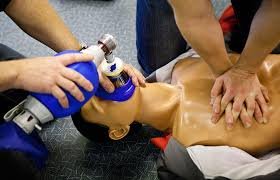How to Manage Depression When Medication Doesn’t Help

Depression affects millions of people across the United States, and for many, traditional treatments like antidepressant medications and therapy don’t provide lasting relief. Fortunately, there are innovative, non-invasive options available — including TMS therapy in Massachusetts, offered by providers like Concierge TMS. This cutting-edge treatment is helping patients take back control of their lives without the burden of side effects that often come with medications.
In this article, we’ll explore how TMS therapy works, who it’s for, and why it’s becoming a top choice for people with treatment-resistant depression.
What Is TMS Therapy?
Transcranial Magnetic Stimulation (TMS) is a non-invasive procedure that uses magnetic fields to stimulate nerve cells in the brain. It’s FDA-approved for the treatment of major depressive disorder (MDD), particularly in patients who haven’t responded well to medication.
TMS targets areas of the brain involved in mood regulation — usually the prefrontal cortex. During a TMS session, an electromagnetic coil is placed gently on the scalp, delivering pulses that activate specific brain circuits. The procedure is painless, requires no sedation, and allows patients to resume normal activities immediately after.
Why Traditional Treatments Don’t Work for Everyone
While antidepressants and talk therapy have helped many people manage depression, they aren’t effective for everyone. According to research, up to 30% of patients with depression don’t experience adequate relief from medications alone. These individuals are often diagnosed with treatment-resistant depression (TRD).
Medication may come with side effects such as:
- Weight gain
- Insomnia
- Sexual dysfunction
- Emotional numbness
- Gastrointestinal issues
Moreover, finding the right combination of medications can take months or even years — and still offer no guarantees. This is where alternative therapies like TMS come into play.
Benefits of TMS Therapy
TMS therapy has shown promising results, especially for individuals who have not responded well to conventional treatments. Here are some of the top benefits:
1. Non-Invasive and Drug-Free
Unlike medications, TMS does not involve ingesting chemicals or undergoing surgery. There’s no risk of drug dependency or withdrawal symptoms.
2. Minimal Side Effects
Most patients report only mild scalp discomfort or headaches during the first few sessions. These side effects usually fade quickly.
3. High Success Rates
Clinical studies and real-world data suggest that around 50–60% of patients experience significant improvement in their depression symptoms, with some achieving complete remission.
4. Convenience
Each session lasts around 20–40 minutes and is typically done five days a week for four to six weeks. You can return to your daily routine immediately afterward — no downtime required.
Who Is a Good Candidate for TMS?
TMS therapy may be ideal for you if:
- You have been diagnosed with major depressive disorder
- You have tried at least one antidepressant without success
- You’re not comfortable with the side effects of medication
- You want a non-invasive, evidence-based treatment
- You are not suffering from epilepsy or have no metallic implants in your head
Your provider will conduct a comprehensive evaluation to determine if you’re a good candidate for TMS therapy.
What to Expect During TMS Treatment
During your initial consultation, a mental health specialist will review your medical history and discuss your treatment goals. Once approved, here’s what the typical process looks like:
- Mapping the Brain
Your provider will identify the exact location in the brain that requires stimulation. - Daily Sessions
Treatment sessions are conducted daily (Monday–Friday). You’ll sit in a comfortable chair, and the technician will place the magnetic coil on your scalp. - Monitoring Progress
Your provider will track your mood and mental health symptoms weekly to measure progress. - Follow-Up Plan
After the course is complete, some patients may need booster sessions, while others maintain their improvement with therapy and lifestyle changes.
TMS vs. ECT: What’s the Difference?
Some people confuse TMS with Electroconvulsive Therapy (ECT), another brain stimulation technique. Here’s a quick comparison:
| Feature | TMS Therapy | ECT |
| Invasiveness | Non-invasive | Requires anesthesia |
| Side Effects | Mild, if any | Can cause memory loss |
| Procedure Duration | 20–40 minutes | 1–2 hours including recovery |
| Daily Life Impact | Return to work same day | Requires recovery time |
TMS is generally considered safer and more tolerable than ECT, especially for people who wish to avoid hospital visits or anesthesia.
Is TMS Covered by Insurance?
Yes! Many major insurance companies now cover TMS therapy for patients diagnosed with major depression — as long as they meet specific criteria. Most providers will help with insurance verification and guide you through the approval process.
Be prepared to provide documentation showing that you’ve tried other forms of treatment, such as medications or psychotherapy.
Complementary Lifestyle Changes That Support TMS
While TMS is highly effective on its own, combining it with healthy lifestyle changes can lead to even better outcomes. Here are some evidence-backed strategies:
- Regular Exercise – Boosts serotonin and dopamine levels naturally
- Mindfulness & Meditation – Helps regulate mood and reduce anxiety
- Healthy Diet – Omega-3s, lean proteins, and leafy greens support brain health
- Sleep Hygiene – Prioritize 7–9 hours of sleep per night
- Social Connection – Stay engaged with friends, family, or support groups
When you approach depression from multiple angles, your chances of long-term recovery increase significantly.
See Also: How to Relieve Pain With Modern Physiotherapy Techniques
Finding a TMS Provider in Massachusetts
If you’re located in Massachusetts and exploring your options, Concierge TMS is a reputable provider specializing in personalized, high-quality TMS treatments. With multiple locations and a focus on patient comfort and outcomes, they’re helping individuals regain hope and vitality after years of struggling with depression.
Whether you’re newly diagnosed or have been battling depression for years, it’s worth exploring the potential of TMS therapy in Massachusetts with a trusted provider like concierge-tms.org.
Final Thoughts
Depression can make it feel like hope is out of reach — but with modern innovations like TMS therapy, there’s a path forward that doesn’t rely solely on medications. Backed by science and increasingly covered by insurance, this non-invasive treatment is changing lives across the country.
If you or someone you love is looking for real relief without the side effects of medication, consider learning more through a trusted provider like Concierge TMS. You have options, and TMS may be the breakthrough you’ve been waiting for.




